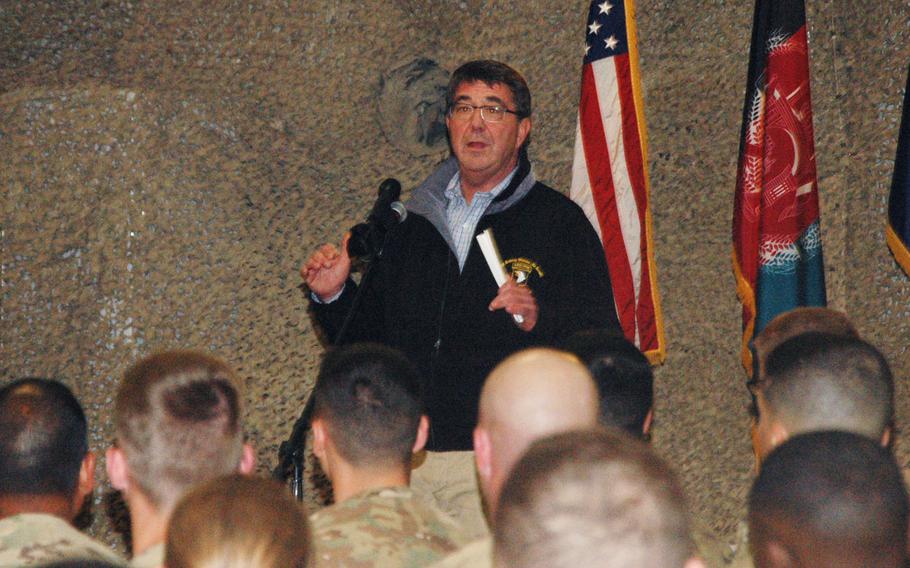Middle East
Troop decision looms as Pentagon chief visits Kandahar
Stars and Stripes February 22, 2015

Secretary of Defense Ashton Carter talks to U.S. troops and Kandahar Air Field in Afghanistan on Feb. 22, 2015. (Jon Harper/Stars and Stripes)
KANDAHAR AIR FIELD, Afghanistan — Secretary of Defense Ashton Carter met with military commanders at Kandahar Air Field in Afghanistan Sunday, as the Obama administration weighs whether to keep troops there.
The base has been a major hub for the U.S. military during the war in Afghanistan. Its strategic location in Kandahar province, the heartland of the Taliban, made it an ideal place from which to launch operations against Islamic extremists.
The air field is now a key training site where the U.S. and NATO are advising the Afghan army as they take the fight to the insurgents. It also hosts American counterterrorism forces, which continue to attack Taliban and al-Qaida targets.
“What you are doing right here in Kandahar… is now becoming the heart of the effort in Afghanistan that will make the success that we have been aiming for all these years -- and have sacrificed so much for -- stick,” Carter told members of the U.S. Army’s 1st Cavalry Division and other units during a troop talk after he met with NATO and Afghan commanders. “When our presence here is reduced to something much smaller than [it is] today, we want to make sure that the Afghans themselves are able to preserve the environment which our forces have created over the last few years -- one of relative security and stability. And they can’t do that without you.”
The troop talk was the first that Carter has held since he became secretary of defense last week.
As overall U.S. troop levels have come down in Afghanistan, so too has the force presence at Kandahar Air Field. The base, which once housed 26,000 coalition troops, is now home to 2,600 NATO servicemembers, including 1,900 American troops.
The total U.S. troop presence throughout Afghanistan stands at around 10,000, down from 100,000 in 2011.
U.S. trainers are slated to pull out of Kandahar at the end of the year as part of the Obama administration’s plan to reduce force levels to a mere embassy presence by the end of 2016. But U.S. officials are reconsidering the drawdown plan, including whether to keep training and advising operations going at Kandahar Air Field.
In remarks during a joint press conference with Afghan President Ashraf Ghani at the presidential palace in Kabul on Saturday, Carter said that President Barack Obama is considering “a number of options” to enhance U.S. support to the Afghan National Security Forces, including changing the timeline for the troop drawdown and altering the timing and sequencing of base closures.
Army Gen. John Campbell, the commander of all international forces in Afghanistan, suggested that he wants to keep troops at Kandahar Air Field as long as people.
“It’s a great platform for us to work that [train, advise and assist] piece,” he told reporters at his headquarters in Kabul on Saturday. “I would lose that capability” if we pull out, and “Kandahar is very important from that perspective.”
When asked about the importance of the base as a counterterrorism operations platform, Campbell said, “I think we have to put that into the calculus as we look at our overall strategy.”
While in Kabul, Carter met with Campbell, Afghan President Ashraf Ghani, and other U.S. and Afghan military and political leaders to discuss the way ahead.
U.S. Army Lt. Col. Ash Worboys, who oversees ANSF development at NATO’s Train, Advise and Assist Command-South, said “it’s going to take some more focus, more time” to get the ANSF where they need to be, and he’d like to see the mission continue at Kandahar Air Field for at least another year.
“While they’ve made a lot of progress, I think our presence helps keep them motivated, helps keep the confidence level up, [and] helps keep them thinking about the next step,” he told reporters.
During his visit to Kandahar, Carter met with Maj. Gen. Abdullah Hamid, the commander of the Afghan National Army’s 205th Corps. NATO troops are advising and assisting Hamid’s forces.
A senior U.S. defense official who attended the meeting told reporters that Hamid didn’t specifically request that U.S. trainers and advisers stay in Kandahar beyond 2015. But the official, who spoke to reporters on condition of anonymity, paraphrased Hamid’s closing remarks as: “I still need your help going forward. I need you to be here.”
During a discussion with reporters after the troop talk, Carter declined to say whether he would recommend to Obama that U.S. trainers and advisers remain in Kandahar beyond the end of the year, but noted that “there is a lot more work to do” there.
harper.jon@stripes.com Twitter: @JHarperStripes